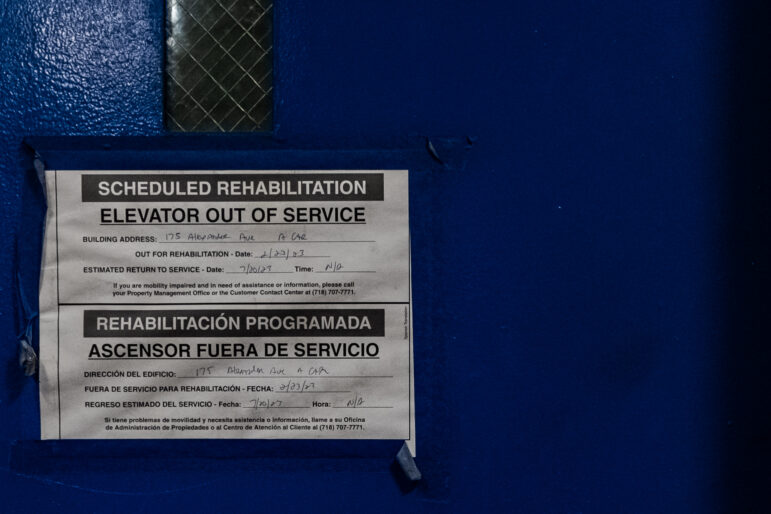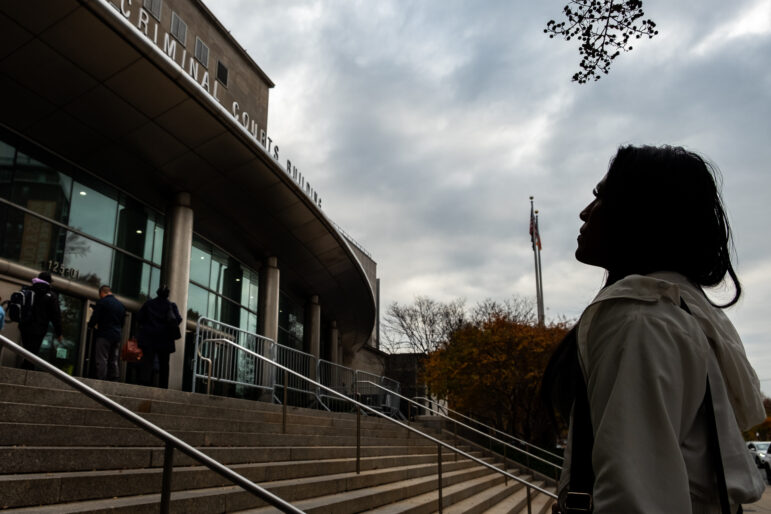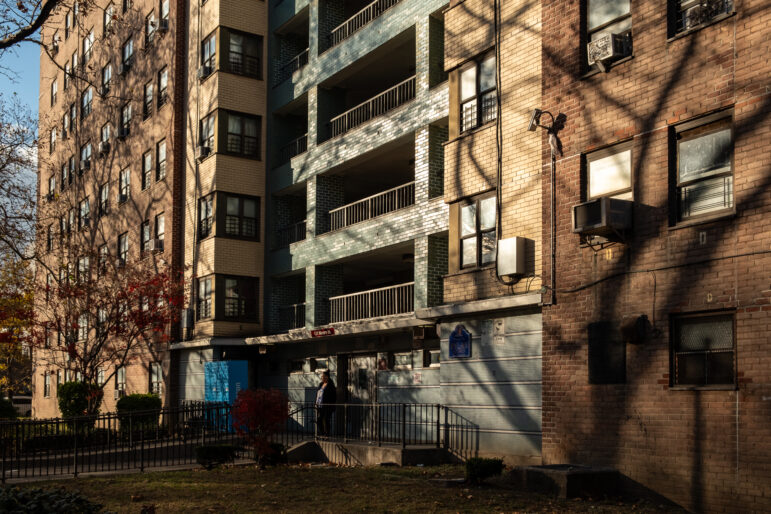Two companies linked to participants in a 1990s bid-rigging scandal involving New York school food contracts are bidding to get back into the business of delivering food to city students.
Brooklyn-based H. Schrier & Co. and Suffolk County’s DiCarlo Distributors were among the six firms that submitted bids last week to deliver produce, groceries and other items to the city’s 1,700 schools. The city Department of Education—which last year spent $411 million on its school food system—plans to award four food delivery contracts, each covering a wide geographic area.
With nearly 900,000 meals served daily—up 11 percent since 2003—the city’s school food system is the second-largest feeding operation in the United States. Only the military’s is larger.
In the late 1990s, a federal investigation uncovered widespread collusion among firms bidding for school food contracts. The firms would agree on which company would get a particular contract, then arrange their bids in a way to guarantee that firm was the low bidder. The scam cost the city money because bidders weren’t competing to deliver at the lowest price.
The Justice Department began bringing charges in the case in 2000, ultimately convicting 25 people and 14 companies, including the company Irving Libertoff, Inc., which pled guilty to anti-trust violations and was made to pay $6.5 million in penalties. Libertoff’s owner Stuart Libertoff also pled guilty and was among at least 13 people sentenced to prison for the scam, receiving a term of 18 months. While the federal case was going on, Irving Libertoff, Inc. transferred its assets to H. Schrier & Co., a company run by Stuart Libertoff’s son and nephew, David and Jonathan Libertoff.
DiCarlo Distributors was also charged in the bid-rigging probe. The company was ordered to pay $2.2 million in restitution to the BOE and its executives, John and Vincent DiCarlo, were sentenced to a combined 11 months in prison and told to pay $790,000 in penalties.
Found non-responsible
DiCarlo was never as big a player in city contracting as the Libertoff firm. According to the city’s vendor database, over their histories Irving Libertoff, Inc. handled 10 times as much work with the city as DiCarlo Distributors did—some $351 million in business.
In fact, even after being convicted of colluding to cheat the city, Irving Libertoff, Inc., kept getting city contracts and purchasing orders. From the time of its conviction in May 2001 to when its work for the city stopped in mid-2003, city departments—chiefly the Department of Correction—registered payments to Libertoff exceeding $4.8 million.
Meanwhile, beginning in 2000, H. Schrier & Co. began to handle city business, receiving $56.6 million in municipal payments from 2000 to 2005. According to city records, the school department allowed Schrier to pick up the business that Irving Libertoff, Inc. had been handling—on the condition that Stuart Libertoff have no involvement with Schrier.
But a 2004 probe by the school department’s then-Special Commissioner of Investigation Richard Condon found continuing connections between Stuart Libertoff and Schrier. Among the findings: Stuart Libertoff and his brother Gary owned GSI Realty, the company that owned the warehouse Schrier used.
The 2004 Condon probe also alleged questionable dealings involving Schrier itself—namely that Schrier used inside information from its control of the school food warehouse to create bids that appeared competitively priced but ended up costing far more than estimated.
According to the Condon probe, at that time the city’s Department of Citywide Administrative Services (DCAS) had declared Schrier a “non-responsible” bidder in part because of Stuart Libertoff’s continuing connection to the firm through GSI Realty.
Even as New York City stopped dealing with Schrier, the firm obtained other government contracts—including from the federal Bureau of Prisons—and since 2004 has been awarded federal work worth $22 million. Schrier also appears to have done a significant amount of contracting with the state of Alabama.
This year, Schrier returned to contracting for New York City. DCAS awarded the firm eight, year-long contracts that took effect in July worth an estimated $2.6 million to supply food for the Department of Correction.
But the school food deal is much larger. The current contracts, which have spanned six to eight years, have been worth a combined $353 million.
Past problems with deliveries
One current DOE food contractor, Chef’s Choice, also has connections to the 1990s federal investigation: Brooklyn-based Chef’s Choice is run by Pat Russo, an ex-cop whose father Frank Russo was indicted along with Libertoff and the DiCarlos and also sentenced to federal prison. Frank Russo’s company, FHR, became Chef’s Choice and Frank Russo died in 2008. Chef’s Choice now delivers food to public schools in Staten Island.
Indeed, school food is now delivered in a totally different way than it was when the bid-rigging was taking place. Back then, the DOE let separate contracts for each category of food—frozen, produce, groceries—in each borough.
In 2004, on the advice of the consultancy Accenture, the DOE consolidated its school food contracts to try to take advantage of economies of scale. DOE divided the city into three massive areas. In each zone, a single firm was hired to fulfill all school food needs—from buying it to storing it to bringing it to school kitchens.
Those very large contracts proved difficult for some firms to handle, resulting in late deliveries and sporadic shortages of food at some schools. The DOE imposed large fines against the contractors for failing to meet deadlines.
Some delivery companies complained that the new, consolidated approach ignored complexities of delivering food. For example, while in theory it might appear that a company could carry all a school’s food on a single truck, frozen food and produce actually have to be transported separately—otherwise you end up with thawed meat or frozen lettuce. But some contractors blamed the mess on winning bidders overestimating their ability to handle the job.
Amid the delays, DOE declared an emergency so it could bring in extra firms, like Chef’s Choice, to help carry the load. The situation stabilized, but a year into the new contract two of the contractors stopped working for the DOE.
In addition, one Brooklyn contractor, Watermelons Plus, “essentially ceased doing business in or about June 2006 after having come to disaster trying to fulfill a contract with the Board of Education,” according to a National Labor Relations Board finding. Around the same time, another firm that handled school food work, Louis Food Service, defaulted on a $2.7 million line of credit, court records indicate.
A new approach
Last year, an audit by the city comptroller cited “weaknesses in the food delivery payment process and in the monitoring of food distributor performance” resulting in “unsupported payments to distributors, failure to receive prompt-payment discounts, and overpayments for donated food,” although the audit only identified $410,000 in overpayments out of a $114 million outlay.
Now the DOE is moving to consolidate its deliveries again, collapsing the current six regions for school food deliveries to four. Under the new contract, the largest zone will encompass part of Brooklyn and all of Staten Island, totaling 105 square miles.
Through a spokeswoman, the DOE says the move from six to four contracts doesn’t represent a major change, because four companies currently handle the work.
The spokeswoman, Marge Feinberg, also downplays the difficulties that occurred after the move in 2004 to consolidate. After “a bumpy start,” she says, “the problems cleared up quickly.” As for the rationale behind this second attempt at consolidation, Feinberg says: “We always are looking to improve operations.”
Emails obtained by City Limits after a Freedom of Information request indicate that H. Schrier and Co. lobbied to have the school food contracts revamped.
In January, David Libertoff wrote to the head of support services for the DOE, Eric Goldstein, to recommend against simply renewing the current contracts: “I know there would be substantial savings if you did not extend for another six months.”
He later wrote that the city would save millions because “current vendors will be forced to reduce their mark up substantially to compete for this business, especially now that my company is back in the bidding process with NYC.”
In a separate note to David Ross, head of the DOE’s division of contracts and purchasing, Libertoff boasted: “There are no secrets out there about my company and our ability to save large purchasing entities money.”
In a terse reply, Ross wrote: “The DOE will review all relevant facts and circumstances regarding Schrier’s responsibility, but we would only do so in the context of a pending contract award.”
One critic of the proposed change in school food deliveries is Russo, from Chef’s Choice, who argues that the DOE’s new approach will squeeze out the little guy—namely, him—by taking the small zone of Staten Island and merging it with a huge swath of southern Brooklyn. “Our warehouse is not large enough to service both Staten Island and Brooklyn,” Russo wrote in a letter to city officials last week. “There are no warehouses available in Brooklyn with freezer, refrigeration and dry storage space capable of servicing this contract. We would have to relocate to New Jersey to do this.”
Other bidders may also harbor doubts about how manageable the new delivery deal will be. After a bid opening for the new school food deal last Friday, would-be vendors gathered in the elevator lobby at the DOE procurement offices in downtown Brooklyn. One vendor consoled a competitor who was clearly out of the running. “You won by losing,” he shrugged.
However, any misgivings didn’t stop the firms from trying to get the work.
Agency defends its choice
The DOE’s request for new school food bids contains a standard clause requiring bidders to “disclose if there are any individuals employed by the company or consultants to the company that were convicted or indicted of any crime related to the antitrust laws in the past 10 years,” and warning that, “You may be barred from doing business with the Board of Education as a result of such indictment and/or conviction.”
No firm affiliated with the Libertoffs would be affected by that clause because the bid-rigging convictions occurred more than a decade ago. What’s more, neither Schrier & Co. nor David and Jonathan Libertoff were ever accused by the feds of wrongdoing. According to real estate records, GSI still owns the property where Schrier’s warehouse is located, but it is not possible to confirm who owns GSI now. David Libertoff did not reply to phone calls and emails seeking comment.
Asked to comment on how Schrier’s bid might be scrutinized given the firm’s history, DOE spokeswoman Feinberg said: “Regarding bids in general, we assess vendor responsibility issues if they are determined to be the lowest responsive bidder.”
DCAS, which declared Schrier non-responsible eight years ago but in 2011 awarded it new city work, says, “From conducting extensive background checks to safety reviews, the city has a comprehensive process for reviewing companies that submit bids.”
“In 2011, H. Schrier and Company was the lowest responsible bidder and disclosed all relevant and required information,” the DCAS statement continues. “A company’s past history is not an automatic disqualification for city work, but one of many considerations in the responsibility determination that city agencies are required to make for every contract they enter into.”








